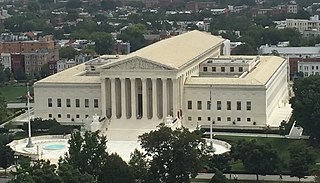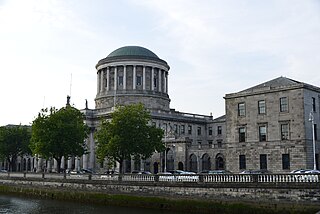Related Research Articles

An appellate court, commonly called a court of appeal(s), appeal court, court of second instance or second instance court, is any court of law that is empowered to hear an appeal of a trial court or other lower tribunal. In much of the world, court systems are divided into at least three levels: the trial court, which initially hears cases and reviews evidence and testimony to determine the facts of the case; at least one intermediate appellate court; and a supreme court (or court of last resort) which primarily reviews the decisions of the intermediate courts, often on a discretionary basis. A particular court system's supreme court is its highest appellate court. Appellate courts nationwide can operate under varying rules.
In the United States, a state supreme court is the highest court in the state judiciary of a U.S. state. On matters of state law, the judgment of a state supreme court is considered final and binding in both state and federal courts.
In the United States, a state court has jurisdiction over disputes with some connection to a U.S. state. State courts handle the vast majority of civil and criminal cases in the United States; the United States federal courts are far smaller in terms of both personnel and caseload, and handle different types of cases. States often provide their trial courts with general jurisdiction and state trial courts regularly have concurrent jurisdiction with federal courts. Federal courts are courts of limited jurisdiction and their subject-matter jurisdiction arises only under federal law.

The United States courts of appeals are the intermediate appellate courts of the United States federal judiciary. They hear appeals of cases from the United States district courts and some U.S. administrative agencies, and their decisions can be appealed to the Supreme Court of the United States. The courts of appeals are divided into 13 "Circuits". Eleven of the circuits are numbered "First" through "Eleventh" and cover geographic areas of the United States and hear appeals from the U.S. district courts within their borders. The District of Columbia Circuit covers only Washington, DC. The Federal Circuit hears appeals from federal courts across the entire United States in cases involving certain specialized areas of law.
In law, certiorari is a court process to seek judicial review of a decision of a lower court or government agency. Certiorari comes from the name of an English prerogative writ, issued by a superior court to direct that the record of the lower court be sent to the superior court for review. The term is Latin for "to be made more certain", and comes from the opening line of such writs, which traditionally began with the Latin words "Certiorari volumus...".

The Supreme Court of Ireland is the highest judicial authority in Ireland. It is a court of final appeal and exercises, in conjunction with the Court of Appeal and the High Court, judicial review over Acts of the Oireachtas. The Supreme Court also has appellate jurisdiction to ensure compliance with the Constitution of Ireland by governmental bodies and private citizens. It sits in the Four Courts in Dublin.
Discretionary jurisdiction is a power that allows a court to engage in discretionary review. This power gives a court the authority to decide whether to hear a particular case brought before it. Typically, courts of last resort and intermediate courts in a state or country will have discretionary jurisdiction. In contrast, the lower courts have no such power. For this reason, the lower courts must entertain any case properly filed, so long as the court has subject matter jurisdiction over the questions of law and in personam jurisdiction over the parties to the case. Customarily a court is granted the power by rule, statute, or constitutional provision. When a constitutional provision establishes the court's power, it will have more limitations on its screening process. The usual intent behind granting power through a constitutional provision is to maintain decisional uniformity.
The federal judiciary of the United States is one of the three branches of the federal government of the United States organized under the United States Constitution and laws of the federal government. The U.S. federal judiciary consists primarily of the U.S. Supreme Court, the U.S. Courts of Appeals, and the U.S. District Courts. It also includes a variety of other lesser federal tribunals.
An interlocutory appeal occurs when a ruling by a trial court is appealed while other aspects of the case are still proceeding. The rules governing how and when interlocutory appeals may be taken vary by jurisdiction.
In law, the standard of review is the amount of deference given by one court in reviewing a decision of a lower court or tribunal. A low standard of review means that the decision under review will be varied or overturned if the reviewing court considers there is any error at all in the lower court's decision. A high standard of review means that deference is accorded to the decision under review, so that it will not be disturbed just because the reviewing court might have decided the matter differently; it will be varied only if the higher court considers the decision to have obvious error. The standard of review may be set by statute or precedent. In the United States, "standard of review" also has a separate meaning concerning the level of deference the judiciary gives to Congress when ruling on the constitutionality of legislation.
The Judiciary Act of 1925, also known as the Judge's Bill or Certiorari Act, was an act of the United States Congress that sought to reduce the workload of the Supreme Court of the United States.

In most legal jurisdictions, a supreme court, also known as a court of last resort, apex court, and highcourt of appeal, is the highest court within the hierarchy of courts. Broadly speaking, the decisions of a supreme court are binding on all other courts in a nation and are not subject to further review by any other court. Supreme courts typically function primarily as appellate courts, hearing appeals from decisions of lower trial courts, or from intermediate-level appellate courts. A Supreme Court can also, in certain circumstances, act as a court of original jurisdiction, however, this is typically limited to constitutional law.

The Judiciary of Ghana comprises the Superior Courts of Judicature, established under the 1992 Constitution, and the Inferior Courts, established by Parliament. The hierarchy of courts derives largely from British juridical forms. The courts have jurisdiction over all civil and criminal matters.

Chng Suan Tze v. Minister for Home Affairs is a seminal case in administrative law decided by the Court of Appeal of Singapore in 1988. The Court decided the appeal in the appellants' favour on a technical ground, but considered obiter dicta the reviewability of government power in preventive detention cases under the Internal Security Act ("ISA"). The case approved the application by the court of an objective test in the review of government discretion under the ISA, stating that all power has legal limits and the rule of law demands that the courts should be able to examine the exercise of discretionary power. This was a landmark shift from the position in the 1971 High Court decision Lee Mau Seng v. Minister of Home Affairs, which had been an authority for the application of a subjective test until it was overruled by Chng Suan Tze.
In law, an appeal is the process in which cases are reviewed by a higher authority, where parties request a formal change to an official decision. Appeals function both as a process for error correction as well as a process of clarifying and interpreting law. Although appellate courts have existed for thousands of years, common law countries did not incorporate an affirmative right to appeal into their jurisprudence until the 19th century.
The judiciary of the Philippines consists of the Supreme Court, which is established in the Constitution, and three levels of lower courts, which are established through law by the Congress of the Philippines. The Supreme Court has expansive powers, able to overrule political and administrative decisions, and with the ability to craft rules and law without precedent. It further determines the rules of procedure for lower courts, and its members sit on electoral tribunals.
A grant of appellate review is dismissed as improvidently granted (DIG) when a court with discretionary appellate jurisdiction later decides that it should not review the case. Notably, the Supreme Court of the United States occasionally grants a petition of the writ of certiorari, only to later DIG the case.
References
- ↑ Andrew F. Daughety, Jennifer F. Reinganum. "Speaking Up: A Model of Judicial Dissent and Discretionary Review" (PDF). Vanderbilt University. Archived from the original (PDF) on 2009-02-25. Retrieved 2008-02-02.
- ↑ See, e.g., 28 U.S.C. §§ 1291 – 1296; 28 U.S.C. §§ 2342 – 2349
- ↑ See, e.g., 8 U.S.C. § 1252
- ↑ Tom Zwart (1994). The Admissibility of Human Rights Petitions: The Case Law of the European Commission of Human Rights and the Human Rights Committee. Martinus Nijhoff Publishers. ISBN 0-7923-3146-X.
- ↑ "Explanatory Memorandum : Thirty-third Amendment of the Constitution (Court of Appeal) Bill 2013" (PDF). Oireachtas.; "Thirty-third Amendment of the Constitution Act, 2013". electronic Irish Statute Book (eISB).
- ↑ "Supreme Court of Ireland". www.citizensinformation.ie. Ireland: Citizens Information Board. 22 January 2015. Retrieved 6 September 2018.
- ↑ "U.S. Supreme Court". West's Encyclopedia of American Law. Gale Group. 1998. Retrieved 2008-02-02.
- ↑ James R. Acker, David C. Brody (2004). Criminal Procedure: A Contemporary Perspective. Jones & Bartlett. ISBN 0-7637-3169-2.
- ↑ "Supreme Courts – Court of Criminal Appeals and Texas Supreme Court". Texas Politics. University of Texas. Archived from the original on 2008-02-02. Retrieved 2008-02-03.